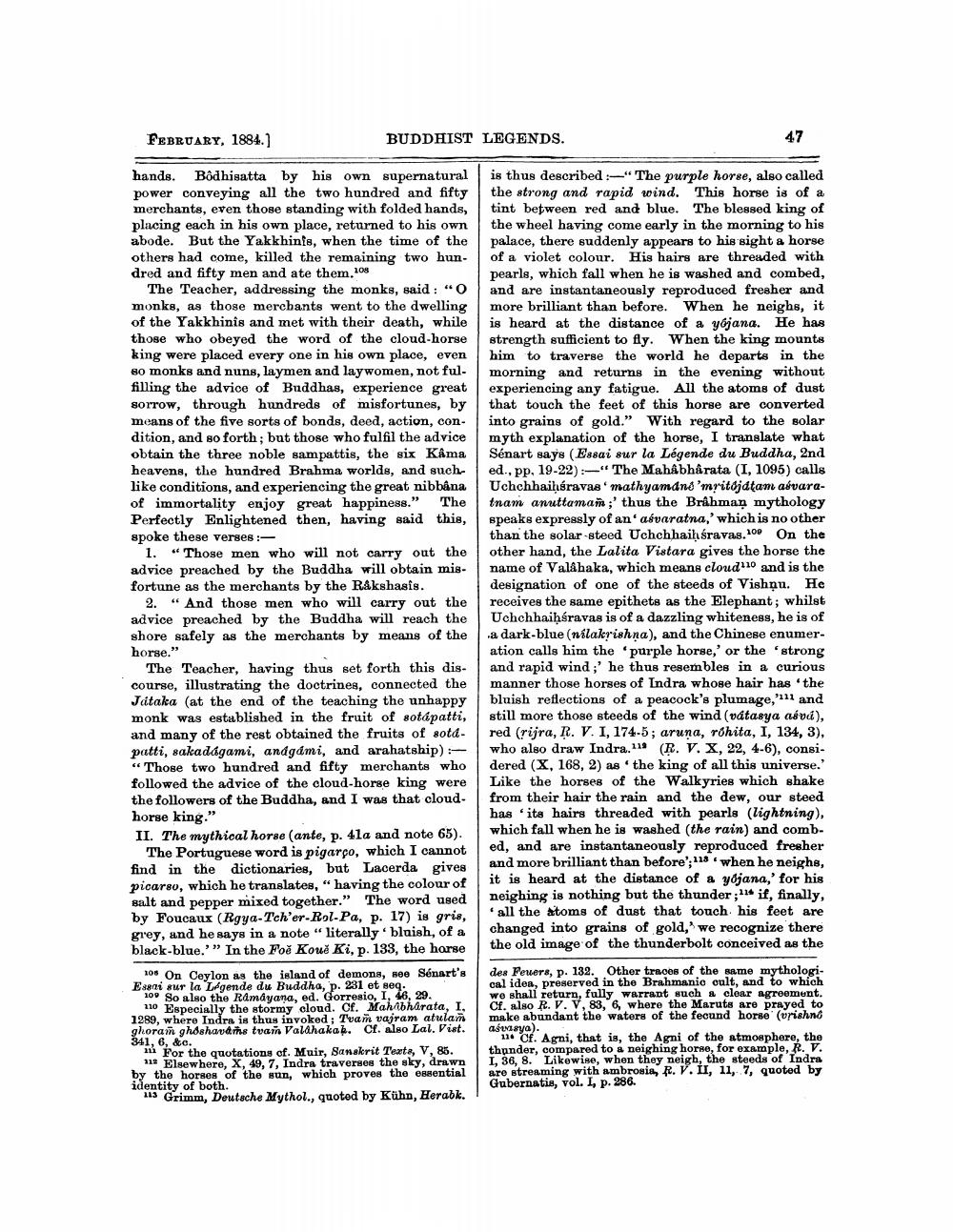________________
FEBRUARY, 1884.]
BUDDHIST LEGENDS.
47
hands. Bodhisatta by his own supernatural power conveying all the two hundred and fifty merchants, even those standing with folded hands, placing each in his own place, returned to his own abode. But the Yakkhints, when the time of the others had come, killed the remaining two hun. dred and fifty men and ate them.108
The Teacher, addressing the monks, said: "O monks, as those merchants went to the dwelling of the Yakkhinis and met with their death, while those who obeyed the word of the cloud-horse king were placed every one in his own place, even 60 monks and nuns, laymen and laywomen, not ful. filling the advice of Buddhas, experience great sorrow, through hundreds of misfortunes, by means of the five sorts of bonds, deed, action, con. dition, and so forth; but those who fulfil the advice obtain the three noble sampattis, the six Kama heavens, the hundred Brahma worlds, and such like conditions, and experiencing the great nibbâna of immortality enjoy great happiness." The Perfectly Enlightened then, having said this, spoke these verses :
1. “Those men who will not carry out the advice preached by the Buddha will obtain misfortune as the merchants by the Rakshasis.
2. “And those men who will carry out the advice preached by the Buddha will reach the shore safely as the merchants by means of the horse."
The Teacher, having thus set forth this discourse, illustrating the doctrines, connected the Jataka (at the end of the teaching the unhappy monk was established in the fruit of sotápatti, and many of the rest obtained the fruits of sotdpatti, sakadagami, anagami, and arahatship) :“Those two hundred and fifty merchants who followed the advice of the cloud-horse king were the followers of the Buddha, and I was that cloud. horse king." II. The mythioal horse (ante, p. 41a and note 65).
The Portuguese word is pigarço, which I cannot find in the dictionaries, but Lacerda gives pioarso, which he translates, “having the colour of salt and pepper mixed together." The word used by Foucaux (Rgya-Tch'er-Rol-Pa, p. 17) is gris, grey, and he says in a note literally bluish, of a black-blue.'” In the Foo Koně Ki, p. 133, the horse
106 On Ceylon as the island of demons, see Sénart's Essai sur la Legende du Buddha, p. 231 et seq.
100 So also the Ramayana, ed. Gorresio, I, 6, 29.
110 Especially the stormy cloud. Cf. Mahabharata, I. 1289, where Indra is thus invoked: Tvam vajram atulañ ghoram ghdshavarhs tvai Valahakal. Cf. also Lal. Vist. 341, 6, &0.
m For the quotations of. Muir, Sanskrit Texta, V, 85.
112 Elsewhere, X, 49, 7, Indra traverses the sky, drawn by the horson of the sun, which proves the essential identity of both. 113 Grimm, Deutsche Mythol., quoted by Kühn, Herabk.
is thus described :-"The purple horse, also called the strong and rapid wind. This horse is of a tint between red and blue. The blessed king of the wheel having come early in the morning to his palace, there suddenly appears to his sight a horse of a violet colour. His hairs are threaded with pearls, which fall when he is washed and combed, and are instantaneously reproduced fresher and more brilliant than before. When he neighs, it is heard at the distance of a yojana. He has strength sufficient to fly. When the king mounts him to traverse the world he departs in the morning and returns in the evening without experiencing any fatigue. All the atoms of dust that touch the feet of this horse are converted into grains of gold." With regard to the solar myth explanation of the horse, I translate what Sénart says (Essai sur la Légende du Buddha, 2nd ed., pp. 19-22): "The Mahâbhârata (I, 1095) calls Uchchhaihsravas mathyamdnd 'mritójdtam aśvaratnam anuttaman;' thus the Brihmaņ mythology speaks expressly of an'aśvaratna,' which is no other than the solar-steed Uchchhaiḥ śravas.100 On the other hand, the Lalita Vistara gives the horse the name of Valåhaka, which means cloud 110 and is the designation of one of the steeds of Vishņu. He receives the same epithets as the Elephant; whilst Uchchhaiháravas is of a dazzling whiteness, he is of a dark-blue (nilakrishna), and the Chinese enumeration calls him the purple horse,' or the strong and rapid wind;' he thus resembles in a curious manner those horses of Indra whose hair has the bluish reflections of a peacock's plumage,'111 and still more those steeds of the wind (vdtasya asvu), red (rijra, R. V. I, 174-5; aruna, róhita, I, 134, 3), who also draw Indra.110 (R. V. X, 22, 4-6), consi. dered (X, 168, 2) as the king of all this universe.' Like the horses of the Walkyries which shake from their hair the rain and the dew, our steed has its hairs threaded with pearls (lightning), which fall when he is washed (the rain) and combed, and are instantaneously reproduced fresher and more brilliant than before'; 118 when he neighs, it is heard at the distance of a yojana,' for his neighing is nothing but the thunder; if, finally,
all the stoms of dust that touch his feet are changed into grains of gold, we recognize there the old image of the thunderbolt conceived as the
des Feuers, p. 132. Other traces of the same mythologi. cal idea, preserved in the Brahmanio cult, and to which we shall return, fully warrant such a cloar agreement. Cf. also R. V. V, 83, 6, where the Maruts are prayed to make abundant the waters of the fecund horse (vrishna aświaya).
11. Cf. Agni, that is, the Agni of the atmosphere, the thunder, compared to a neighing horne, for example, R. V. I, 36, 8. Likewise, when they neigh, the steeds of Indra are streaming with ambrosia, R. V. II, 11, 7, quoted by Gubernatis, vol. I, p. 286.




